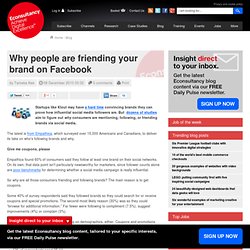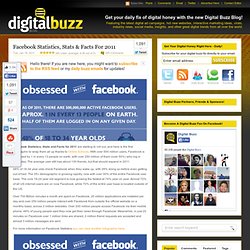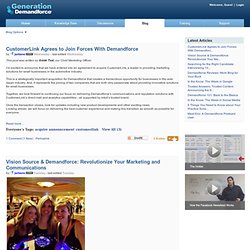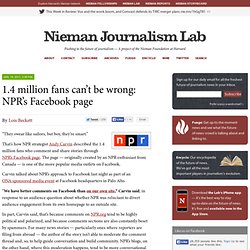

Facebook Marketing Statistics, Demographics, Reports, and News – CheckFacebook. Why people are friending your brand on Facebook. Startups like Klout may have a hard time convincing brands they can prove how influential social media followers are.

But dozens of studies aim to figure out why consumers are mentioning, following, or friending brands via social media. The latest is from Empathica, which surveyed over 15,000 Americans and Canadians, to deliver its take on who's following brands and why. Give me coupons, please Empathica found 60% of consumers said they follow at least one brand on their social networks. On its own, that data point isn't particularly newsworthy for marketers, since follower counts alone are poor benchmarks for determining whether a social media campaign is really influential. So why are all those consumers friending and following brands? Some 40% of survey respondents said they followed brands so they could search for or receive coupons and special promotions.
The reasoning didn't vary much depending on demographics, either. The key here? Getting it right. Exclusive: French Facebook Marketing Report. Social Map. What’s on your mind? Facebook Statistics, Stats & Facts For 2011 Facebook Statistics, Stats and Facts for 2011 are starting to roll out, and here is the first infographic to wrap them all up thanks to Online Schools.

With over 500 million users, Facebook is now used by 1 in every 13 people on earth, with over 250 million of them (over 50%) who log in every day. The average user still has about 130 friends, but that should expand in 2011. 48% of 18-34 year olds check Facebook when they wake up, with 28% doing so before even getting out of bed. The 35+ demographic is growing rapidly, now with over 30% of the entire Facebook user base. The core 18-24 year old segment is now growing the fastest at 74% year on year. Over 700 Billion minutes a month are spent on Facebook, 20 million applications are installed per day and over 250 million people interact with Facebook from outside the official website on a monthly basis, across 2 million websites.
Facebook 2010: The Saga Continues. This post was written by Jenny Urbano, our Social Media Manager.

Here at Demandforce, we love seeing and celebrating your ideas! And more than that, we love to hear from YOU. We want to bridge the gap between us and you, so that’s why we’re offering a once in a lifetime opportunity to win a trip to San Francisco, sightsee in this amazing city, visit Demandforce headquarters and share your ideas with us! 6 winners, and a guest of their choice will be flown out to San Francisco, California on March 12-14th, 2014, where they will stay in Union Square, spend a day at Demandforce, have dinner with the team, and explore the lovely City by the Bay!
For contest rules, and how to enter, please visit our post in the Generation Demandforce Community here. Good luck! 1.4 million fans can’t be wrong: NPR’s Facebook page. “They swear like sailors, but boy, they’re smart.”

That’s how NPR strategist Andy Carvin described the 1.4 million fans who comment and share stories through NPR’s Facebook page. The page — originally created by an NPR enthusiast from Canada — is one of the more popular media outlets on Facebook. Carvin talked about NPR’s approach to Facebook last night as part of an ONA-sponsored media event at Facebook headquarters in Palo Alto.
“We have better comments on Facebook than on our own site,” Carvin said, in response to an audience question about whether NPR was reluctant to divert audience engagement from its own homepage to an outside site. In part, Carvin said, that’s because comments on NPR.org tend to be highly political and polarized, and because comments sections are also constantly beset by spammers. But Carvin also emphasized the importance of audience expectations. The result, Carvin said, is that conversations on NPR’s Facebook page can become surprisingly intimate. You Don’t Know One-Fifth Of Your Facebook Friends.